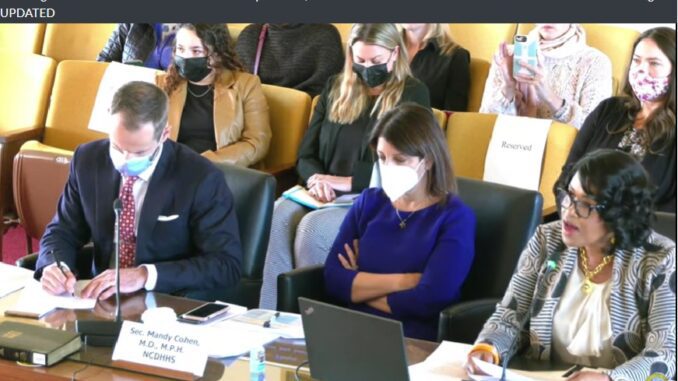
RALEIGH — At its Dec. 7 meeting, the Union County School Board voted 8-1 to approve a resolution that calls for the state to end contact tracing and quarantining processes for K-12 students on or before Jan. 19, 2022.
The Union County Board of County Commissioners had unanimously passed the resolution at a meeting a day earlier on Dec. 6.
“The presence of COVID-19 in our state and county is likely to persist well into the future without a known or defined end,” the resolution reads. It goes on to say they will still work to support local health officials going forward.
The resolution draws attention to the two processes negatively impacting schools, stating that “data and evidence consistently and strongly demonstrate that students who are sporadically, suddenly, and repeatedly excluded from school due to quarantine requirements have decreased academic performance, increased behavioral issues, and suffer emotional and psychological effects from the isolation and removal from peers.”
The StrongSchools NC Toolkit contains guidance on the quarantine and contact tracing process. The document was updated to include a new quarantine provision on the same day as Union’s board meeting.
The resolution also calls the procedures “unduly burdensome for local public health officials and school staff,” and “significantly detrimental to the school environment, and highly disruptive to North Carolina families, students, schools, and employers.”
Union County Schools and N.C. Department of Health and Human Services Secretary Mandy Cohen clashed earlier in the school year when the district proposed dropping the contact tracing and quarantining procedures.
Cohen threatened legal action against the district which had the effect of exposing the district’s objections to the overburdensome nature of the process as well as lack of authority related to quarantining.
Earlier on Dec. 7, a hearing on COVID fund spending was held by a legislative subcommittee of the Joint Legislative Commission on Governmental Operations.
“Yesterday’s hearing was informative and troubling,” Sen. Chuck Edwards (R-Henderson), co-chair of the subcommittee said in a statement. “We heard a lot of good information about our state’s continued recovery from the pandemic, but I’m concerned about how we move forward from the pandemic. There is no clear, comprehensive ‘off-ramp’ and the Cooper Administration refuses to acknowledge that we are no longer in a state of emergency.”
Cohen was questioned during the hearing by multiple lawmakers on the quarantine process. She was also directly asked about the past conflict with Union County Public Schools by Sen. Todd Johnson (R-Union).
Johnson asked Cohen about the toolkit and whether or not districts really had any local control. He cited the Cooper administration moving from statewide orders to more “local control.”
“I am going to need to put local control in parentheses because it’s more like ‘local control as long as you do what the toolkit says’,” said Johnson, who has two K-12 aged children. “I don’t know that that’s actually local control.”
Johnson went on to question the quarantining of healthy children and stressed the negative impacts of children being forced out of school due to quarantines. Johnson said that there “is so much more to being ‘healthy’ than the absence of COVID,” and also compared the process to “deputizing” school employees as health care providers.
“For the record, is the toolkit a recommendation, a law, or simply a suggestion?” asked Johnson.
Cohen did not answer the question as asked, deferring into a set of statements about how “critical it is to keep our kids in the classroom and learning.”
In the response she did give, she called quarantining “an absolute last resort.”
“If kids are vaccinated, they don’t need to quarantine. If they are wearing masks, they don’t need to quarantine,” said Cohen. “They [schools] need to be using quarantine as a last resort.”
Cohen added that “the places that are using those tools” of masking and vaccination have “had to quarantine very few kids.” She said that “we disagree” with using quarantine as a “first resort.”
In addition to Johnson, Cohen was asked by at least two other legislators whether or not the StrongSchools NC Toolkit was a mandate, recommendation, law, or suggestion. In every instance of that question, Cohen did not provide a direct answer and at one point described it as a “guideline.” When pressed, she would not commit to ending the use of the toolkit in the future.
Cohen also would not say when the StrongSchools Toolkit would be rescinded, however, on the same day as the hearing a presentation was given by her agency to the Department of Public Instruction.
Slides presented by Cohen’s agency (NCDHHS) mirror some of the remarks and data she provided before the legislature subcommittee.
The final few slides presented cite changes to the StrongSchools NC Toolkit that include updated language on vaccinations for kids ages 5 to 11 and that physical distancing should only apply activity inside the school building.
The toolkit was also updated to exempt students from quarantine “who have tested antibody positive in the last 3 months.”
“Previously to qualify for this exemption, individuals would need to also have limited or no contact with high-risk individuals. This language has been removed,” the slide reads. “Now exemption from quarantine can be considered, at the discretion of the LHD, for any person who has tested antibody positive within 3 months before or immediately following close contact. See pages 16-17 for more information. We also added this in our StrongSchoolsNC FAQ.”
Topline numbers in the presentation by NCDHHS include 2,281 (65%) schools have opted in to COVID site testing (89 LEAs of 115 in NC) and 1,256 (35%) schools opted out.
On vaccination rates, 15% of children ages 5 to 11 and 45% of children ages 12 to 17 have received at least one dose. NCDHHS also says that North Carolina is the top state in the southeast for the percentage of vaccinated children at 14.2%.
COVID “clusters” in schools are “plateauing,” according to NCDHHS’ slide presentation. However, the accompanying chart shows a steep decline starting after Sept. 12 with the number of clusters close to zero as of Nov. 21.
Additionally, reported child COVID infections across all age ranges (0 to 17) peaked in mid-September and began a steep decline around Sept. 19. By Nov. 14, all age range infections were down well below 200 per 100,000 population.


